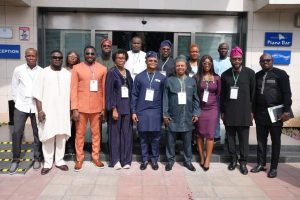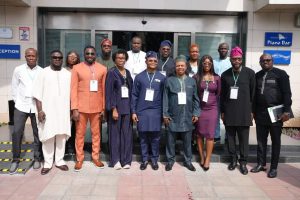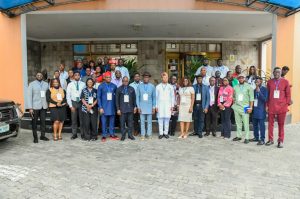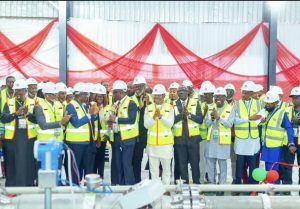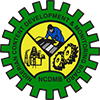Local capacities developed through the implementation Nigerian Content Act sustained the operations of the Nigerian Oil and Gas industry during the height of the COVID-19 pandemic, the Executive Secretary, Nigerian Content Development and Monitoring Board (NCDMB) Engr. Simbi Kesiye Wabote has said.
He stated this on Monday in a goodwill message he delivered at the Nigerian Content Capacity Building Workshop organised for Media Stakeholders in the South-South region, held in Port Harcourt, Rivers State.
He explained that operations of the sector continued without disruptions even after many expatriates had returned to their countries because Nigerians had developed robust human and infrastructural capacities to operate the highly technical sector.
The Executive Secretary spoke through the zoom meeting platform and enumerated some of the achievements recorded by the Board during the COVID-19 pandemic to include commissioning of the NCDMB new head office by President Muhammed Buhari on August 13, increase of the the size of the Nigerian Content Intervention Fund from US$200million to US$350million and addition of new products to the NCI Fund, notably the Working Capital Loans and Women in Oil and Gas Loans.
Other accomplishments during the period include the approval of the US$50million Nigerian Content Research and Development Fund by the NCDMB Governing Council, commissioning of the 5,000 barrels per day Waltersmith Modular Refinery at Ibigwe, Imo State in November and approval of additional partnerships in the Nigerian Content commercial ventures programme, especially in the gas value chain.
He added that the Board also progressed the implementation of the 10-year Strategic Roadmap, held the checkpoint review session for the roadmap, continued the construction of Oil and Gas Industrial Parks and secured the Final Investment Decision (FID) and Award of Contracts for the NLNG Train 7.
Wabote also confirmed that NCDMB had achieved 32 percent value retention from the annual spend in the Oil and Gas Industry. He noted that only five percent was being retained when the Nigerian Content Act was enacted in 2010 and the percentage grew to 26 percent in 2017, after seven years of focussed implementation.
He reiterated that the vision of the Nigerian Content 10-Year Strategic Roadmap is to achieve 70 percent value retention by the year 2020. Other targets of the roadmap are to create 300,000 jobs, retain $14bn out of $20bn annual industry spend, build shipyards and manufacturing facilities.
In his presentation, the General Manger, Corporate Communications and Zonal Coordination Division, NCDMB, Dr. Ginah O. Ginah hinted that the Board and operating oil companies had jointly deployed the Community Content Guideline (CCG), which provides a framework for engaging youths of host communities in employment, training and contracts in projects. The CCG also provides for the establishment of critical infrastructure to stimulate development, attract new businesses to host communities and sustain the growth of host community entrepreneurs through funding and policy support.
One of the key provisions of the CCG is that 100 percent of unskilled job roles should be reserved exclusively for indigenes of the host community of projects, while 50 percent of semi-skilled roles should be exclusively reserved for indigenes of host communities. Similarly, at least 10 percent of skilled roles are to be reserved for indigenes of host communities.
The General Manager, Strategy and Transformational Projects, NCDMB Engr Abayomi Bamidele made a presentation at the workshop on the Mid-term review of the Board’s 10-Year Strategic Roadmap.
Represented by the Supervisor, Strategy and Transformational Division, NCDMB, Mr. Olabisi Okunola, he stated that the Mid-term review indicated that it was imperative to grow Nigerian Content attainment by 11 percent year on year to achieve the targets set in the Nigerian Content 10-Year Strategic Roadmap.
He said the Board had initiated some steps to accelerate the attainment. Some of them included the extension of coverage to other segments of the oil and gas industry such as catalysing modular refineries and gas value chains. Another step is accelerating sectoral linkages with key input industries like the steel sector and securing additional finance for key industry needs.
Earlier in his address, the Manager, Corporate Communications, NCDMB, Barr. Naboth Onyesoh underscored the essence of the workshop. He said it was conceived to deepen the cordial relationship the Board had built with the media over the past 10 years.
He also hinted that the workshop was in furtherance of the Nigerian Content 10-Year Strategic Roadmap, particularly, the enabler which focuses on Collaboration and Stakeholder Engagement.
Other presentations were by Mr. Chido Nwakanma, Adjunct Faculty, Pan-African University, who spoke on the “Role of the media in achieving Nigerian Content 10-year Strategic Roadmap,” and Prof. Teilanyo Diri, from the Faculty of Humanities and Social Sciences, Federal University, Otuoke, who made a presentation on “Improving Writing Competencies to meet Evolving Media Trends”.
Mr. Nwakanma challenged the journalists to practice the type of journalism that provides people with verified information they can use to make better decisions. “News you can use is now the focus area of our audiences. Provide people with news they can use.”
He also canvassed the practice of journalism that offers solutions. “Solutions journalism focuses on solutions: what people are doing to cope with challenges, so others can learn,” he said.
Prof. Diri drew the attention of the journalists to the deteriorating quality of news reporting as a result of the influence of the new media, which features largely informal writing styles and uncensored patterns.
He charged Nigerians journalists to be abreast of the skills required in the emerging times but to protect the integrity and values of their profession. Journalists he counselled, should adhere to the principles of objectivity, fairness and balance and avoid some popular yet undignifying conventions that obtain in some evolving media.
Discover more from Nigerian Content Development & Monitoring Board
Subscribe to get the latest posts sent to your email.

